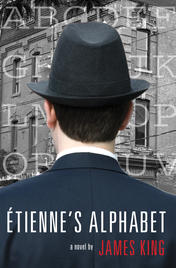Fiction

Excerpt from “Blink”
You’d understand if you could see her. Here, in the Saturday morning street market, a black coffee in one hand, the other gently running over the spines of tattered books on a book table. Everything about her conspires toward composure. Each strand of hair flowing with the others, the perfectly cut line where her hairline parts. She’s not a woman who fidgets. She has the composure of the stone women who hold up temple roofs.
Do the melancholy candle vendor, the grim Belgian chocolatier, the slow grazing market goers feel this way around her? Redundant. Untethered, wanting to hold her hand so as to not float away.
Lost. I’ve lost sight of her.
The market air shudders. Oceans lie down on me. A flock of wingless, cawless birds fling themselves over the buildings, the Saturday shoppers motionless, paper thin and oblivious. Lost.
She turns then and I see her in profile, eating caramelized ginger delicately from a paper bag like it’s a secret between her and the ginger. Not lost.
Silly. I think, silly. Like a child. My mother must have used this word once. Many times. Don’t be silly.
I mention this to my therapist, how I lose her. It’s not the first time. He, predictably, asks how it makes me feel. Silly, I say. He, predictably, looks concerned.
I don’t tell him how I am braced for this pain now, braced waiting for the next sinkhole, for the sound to suck out of the room, and the deep, sea-floor silence to press in.
She’ll turn then, colour gushing back in, and see my furrowed forehead, throw me a subtle lift of her eyebrows to ask what’s up, as if nothing. Silly.


Niko
I’ve always been good at leaving. I left Athens when I was twenty-three and while the lead-up had been difficult—studying, worrying about money, mandatory army service—by the time it came to leave, I was ready. I showed up at the airport four hours early and while waiting I realized that I was no longer seized with panic about my future. Jacqueline Kennedy had recently married Aristotle Onassis, and my mother thought it was a good omen, as if the union of a Greek shipping magnate and a beloved American president’s widow had a bearing on my life abroad. I dismissed it at first, but when I landed in the United States, the first newspaper article I saw was about them, and for once I thought my mother was right: it was a good sign.
After that first departure, each subsequent move was easier. I assumed this momentum would carry forward to my latest decision to return to Athens from Toronto to work for Calypso, the shipping company that had once, long ago, belonged to my family, even if circumstances were different from when I’d been in my twenties.
My cousin George met me at the airport. He’d insisted on picking me up, and after saying goodbye to Anna and Zoe and then sitting through my flight in silence, I was happy to see him.
“Are you excited to see your new home?” he asked in the car as we drove into Athens.
“You tell me.”
When I’d finalized my plans to take the job at Calypso, I’d asked George to help me find a place to live. I’d given him the bare minimum of criteria and within a week he’d found me something in the neighbourhood of Kypseli.
“There it is!”
He pointed to a nondescript beige building that looked similar to the nondescript beige buildings beside it. The street was lined with cars parked bumper to bumper all the way down the length of it, a few creeping up on the sidewalk. He circled the block looking for a parking spot, gave up, and then just idled by the front door while a lineup of cars developed behind us.
“Go and see the apartment on your own first,” he said, and passed the keys to me. “I’ll join you when I find a parking spot. If you hate it, you can think of a nice way to tell me.”
The driver behind us leaned on his horn as I struggled with my suitcases, so I took my time with my last one to piss him off even more. George screeched off. I stood at the front door, put the key in the lock, but no matter how much I jiggled, it wouldn’t open. An older woman came up behind me with bags of groceries while I tried a different, useless key.
“Excuse me,” I said. “Do you live here?”
“Of course. Do you?”
“As of today.”
“You just arrived?”
“I’m moving in on the fourth floor.”
“Oh,” she said, eyeing me up and down. “I’ve heard about you. I’m Maria.” She and her husband, Spiro, lived next door to me. She let me in.
During the few weeks between George picking up the keys to the apartment and my arrival, the lock on the front door had been changed. I later found out it was changed often, due to an ongoing feud between the bakery next door and the man who lived on the first floor of my building, Yianni. He was seventy years old, but looked as though he’d been eighty-five for the last fifteen years and would continue to look as such until he died, probably at the age of one hundred. He was wrinkled and rickety and couldn’t walk around the block, but after years of practice, he knew how to raise hell. His hard-headedness was persistent.
Because of a shoddy wiring job, the bakery and our adjoined apartment building shared an electrical breaker box. It was in our lobby, and occasionally the married couple who owned the bakery had to use it. Elly and Thomas were Albanian, and Yianni didn’t approve of them having access to the building. After all, Albanians were prone to theft, and even if Elly and Thomas were good people, he said, their friends were a problem. Others in the building quietly agreed, but Yianni was the only one who went out of his way to shut Elly and Thomas out. Most of the time he’d just grumble about it, about how when he was younger he’d never had these problems, that it was only in the past few years with the influx of Albanian immigrants into Greece that he’d had to worry. Then he’d read an article in the newspaper about a crime supposedly perpetrated by an Albanian and would be motivated enough to use his own pension money to change the locks without consulting anyone first. One by one, each apartment would get new keys and then someone would sneak a copy to the bakery as well, and the cycle would repeat. I suspected it was Maria who slipped Elly and Thomas the keys.
The elevator was too small to fit Maria and me, my suitcases and her groceries, so I let her go up first. The key to my apartment worked fine. My landlord was a Greek man who now lived in Chicago and had kept the apartment in case he needed it in the future. He’d furnished the place sparsely, and it was small, but functional: one bedroom, a kitchen, a balcony, a desk in the front room, a couch. A silver-plated icon of Mary holding baby Jesus hung above the bed in the bedroom, but otherwise the walls were empty.
George buzzed and I let him in. “What do you think?”
“It’s perfect.”
He walked around the small space and explained its quirks. “You turn the hot water heater on here, and the window by the balcony sticks, so don’t use it.”
“I’ll fix it,” I said, and he laughed as if to say Don’t bother. When he finished his tour, he handed me a small cardboard box he’d carried in with him. “This is from Katerina. She would be happy if you came over for dinner tonight.”
George, his wife, Katerina, and their two young children lived in a suburb forty minutes away by car if you were lucky with traffic, well over an hour if you weren’t. He’d tried to convince me to live out there as well, but I’d chosen Kypseli because I’d grown up here and couldn’t imagine living anywhere else.
“It’s okay,” he said before I answered. “You’re jet-lagged. She’ll understand, but you have to visit this week.”
George left, pleased that I was satisfied with his apartment choice. I slipped off the blue, curlicued ribbon from around the box and found that it was full of cookies, almond twists dusted with powdered sugar and pieces of crushed pistachio, the kind sold by the kilogram at bakeries.
I hung my clothes in a closet that smelled strongly of mothballs. While I was debating if I should eat the box of cookies for dinner, someone knocked on my door. It was Maria, holding a plate covered in tinfoil. “Eat,” she said, and left without much more conversation. I peeled back the foil and there were two peppers and a tomato glistening in a pool of reddish oil, the vegetables stuffed with rice and ground beef.
That evening I sat at the desk with the food and wondered if it had been a good idea to rent this apartment. I was living only two blocks away from my childhood home. I’d walked on this street dozens of times and passed this exact building, but I’d never conceived that one day I might be living in it. My childhood self would’ve laughed. My twenty-year-old self would’ve punched me in the face. But over the years my priorities had shifted, and returning to Greece now, in my fifties, seemed like the natural progression of things.







